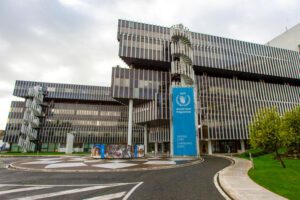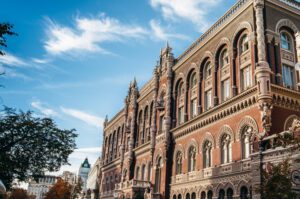
The United Nations World Food Program (WFP) deepens cooperation with Ukraine in the context of the blocking of its maritime agricultural exports by warships of the aggressor country of the Russian Federation, the issue of the organization’s purchase of Ukrainian grain and its subsequent delivery to countries that are threatened hunger.
The relevant issue was discussed by Minister of Agrarian Policy and Food of Ukraine Mykola Solsky and WFP Executive Director David Muldow Beasley during a meeting in Kyiv, according to the website of the Ukrainian department on Friday.
“The possibility of purchasing surplus grains in Ukraine at the expense of the World Food Program was discussed in order to provide food for the countries of Africa and the Middle East and prevent global famine in these regions, the threat of which is very real,” the ministry said in a statement.
The agency stressed that WFP has deployed large-scale humanitarian assistance to Ukrainians affected by the war. In particular, contacts have been established with bakeries, flour mills and food industry enterprises in Ukraine for the purchase of goods from them and subsequent delivery to the regions affected by the Russian military invasion.
“We are talking about about 40 thousand tons of food products. Seven warehouses have been opened in Kyiv, Lvov, Dnipro, Vinnitsa, Chernivtsi, Odessa and Kropyvnytskyi. And in Lviv, Vinnitsa and Ivano-Frankivsk regions, financial assistance is provided to immigrants,” Beasley quotes press service of the Ministry of Agrarian Policy.
In turn, Solsky during the meeting focused on the need to unblock Ukrainian seaports and shipping routes in order to ensure the export of agricultural products from Ukraine.
“In order to stabilize the situation, it is important to ensure the logistics of supplies of agricultural products from Ukraine through unblocked ports and alternative routes. In addition, small and medium-sized Ukrainian farms and agricultural enterprises, which play a big role in ensuring national and global food security, need urgent help,” – quotes the department of its head.
As reported, on April 13, UN Secretary General António Guterres said that the war in Ukraine could doom more than 1/5 of humanity to poverty, want and hunger unprecedented for decades.
Deputy Minister of Economy – Trade Representative of Ukraine Taras Kachka stressed that the reason for the threat to world food security and rising prices for agricultural raw materials is the blockade of Ukrainian ports by Russian warships, therefore the lifting of the naval blockade of Ukraine is more effective for the food security of the world than the creation of new special funds. He stressed that Ukraine must repulse the aggressor at sea and on land, so that Ukrainian grain and oilseeds would reach the world market in full.
To date, the capacity of alternative logistics routes bypassing Ukrainian seaports is estimated at 600,000 tons of crops per month. This figure can be increased to 2-3 million tons of agricultural crops per month by increasing the capacity of railway and logistics crossings at the borders with the EU countries.
Before the Russian military invasion, Ukraine monthly exported up to 5 million tons of agricultural products through the ports of Odessa and Nikolaev, but now, due to their naval blockade by the Russian Federation, the country can transport about 500 thousand tons of grain monthly. This leads to a monthly shortfall of about $1.5 billion in export earnings.

The National Bank of Ukraine (NBU) expects a significant deterioration in trade indicators in 2022, but with a current account deficit near zero at the end of the year, Deputy Head of the Central Bank Serhiy Nikolaychuk said during a discussion organized by the Center for Economic Strategy (CES).
“So far, given our basic assumptions, we expect the current account deficit to be close to zero throughout this year. But in the memo, take into account that the outflow from the current financial account will be quite significant,” he said.
The deputy head of the National Bank noted that he had questions about the statistics recently published by the Ministry of Economy, in which imports in March fell significantly more than exports. “Based on the payments that we see, we do not see such a sharp reduction in imports and do not see that exports feel much better than imports,” Nikolaychuk stated.
According to him, an important component is the expansion of expenses of Ukrainian citizens abroad, which are not visible in the statistics for imports, but are visible in the payments of Ukrainian banks in foreign currency for Visa and Mastercard settlements. “In the balance of payments, this is an operation that leads to an expansion of the current account deficit,” the deputy head of the NBU explained.
He also clarified that now, when analyzing the current account, it is necessary to take into account that for a month and a half a significant part of imports came as humanitarian or military aid.
“We will see an increase in the trade deficit, but this will be offset by transfers to the secondary income account. That is, free humanitarian aid leads to a neutral impact on the current account,” the deputy head of the National Bank said.
It is also important to keep track of income from IT services, the dynamics of transfers, as there are different scenarios and different opportunities and risks, Nikolaychuk added.
In his opinion, imports will remain suppressed for a sufficiently long period, so the situation with the payment account will not be so bad. “But at the next stage, when we talk about the restoration of the Ukrainian economy after the war, we can count on a greater expansion and current account deficit. But let’s hope for financing from different sources,” the deputy head of the National Bank emphasized.
As reported, the World Bank, in its strongly deteriorated forecast for Ukraine, released this week, expects a current account deficit of 6.8% of GDP this year and its expansion to 16.8% of GDP in 2023.

NPC Ukrenergo has completed construction and opened a new 330kV high-voltage line in western Ukraine, said Volodymyr Kudrytsky, chairman of the board of the company.
“Today is Ukrenergo’s birthday (…) It is very symbolic that on this very day we are opening a new 330 kV high-voltage line in western Ukraine. This is the first power facility that Ukrenergo completed during the war,” he wrote on his page on Facebook on Friday.
Considering the limitation of martial law, Kudrytskyi did not talk in detail about this facility, but noted that the new line will increase the reliability of the Ukrainian network in terms of synchronous operation with ENTSO-E and create opportunities for the energy system to receive additional reserves from the Dniester PSP, which means – became more flexible and stable.
“Right now, it is important for us to report that Ukrenergo is able to operate and develop networks even in wartime conditions. Our efforts are focused not only on the resumption of networks affected by hostilities, but also on construction in regions where it is possible to continue implementing new infrastructure projects,” – stressed the head of Ukrenergo.
The company’s message on the website states that the cost of the project amounted to UAH 546 million. According to her, this is 20%, or UAH 134 million, less than the initial cost of the project.
The savings were achieved due to competition in the tender, as well as mainly due to the optimization of design solutions, the company explained, pointing out that the source of funding was Ukrenergo’s tariff funds and the company’s income from the sale of access to interstate cross-sections.
They indicated that the construction of the line, which took 17 months, was provided for in a 10-year plan for the development of the transmission system.
The importance of its opening is increasing due to the gradually growing consumption of electricity in the western region, which is associated with the relocation of business along the left-bank part of Ukraine to the western regions, Ukrenergo noted.
“The new line, together with previously installed equipment, significantly increases the reliability of power supply to consumers and industry throughout the Chernivtsi region,” the company stressed.
In addition, the line is also important for balancing the energy system of Ukraine, because thanks to it, in particular, the reliability of the operation of the Dniester PSP in pumping and generating modes by three hydraulic units in the normal scheme is increased, and taking into account the future construction of another 330 kV overhead line – by four hydro units.
“To connect the line, a number of works were carried out at two substations 750 kV and 330 kV. In particular, relay protection devices, emergency automation and communication devices were replaced at the 330 kV substation, and a new 330 kV closet was built at the 750 kV substation to connect the line,” the company described the work.

A group of Ukrainian and international experts analyzing the real impact of the sanctions applied against Russia have discovered shipments of Kazakh oil that may secretly contain Russian oil, Oleg Ustenko, economic adviser to the President of Ukraine, said in a commentary to The Economist.
“A group of experts has already managed to detect shipments of Kazakh oil, which they believe contain part of the secretly loaded Russian oil,” Ustenko said, quoted on the website of the official website of the President of Ukraine on Friday.
As the source explained, the expert group tracks tankers with Russian oil using network analysis software, which, in particular, allows you to establish links between disparate data.
Experts are tracking the energy supply routes through which “Russia is desperately trying to finance its war machine.”
Information to the group is provided by both international experts and members of the government of other countries and even intelligence.
“The program analyzes the behavior of ships, taking into account various information. For example, the declared cargo, route and insurance data, as well as historical navigation patterns in various weather and market conditions. You can even see the tonnage of cargo on board the ship and understand if there is a suspicion that on There may be more cargo on board than stated,” the website notes with reference to Ustenko.
Experts following the results of the analysis send warnings to the relevant governments and companies, including Ukrainian departments.
In addition, a more modern approach is being taken, which involves the use of satellites in low orbits to receive signals from airborne radars.
“They’re used for navigation and collision avoidance, so sailors don’t tend to turn them off,” the source explained.
New signal processing software determines the geolocation of the signal source, sometimes within a few hundred meters.

Kyiv will leave tariffs for hot water at the level of the previous heating season until May 31, Kyiv Mayor Vitali Klitschko said.
“Today, in the conditions of martial law, when people found themselves in a difficult financial situation, we made an important decision on the provision of public services in the capital. This decision will ensure the use of tariffs for hot water and heat energy for its preparation until May 31 at the level of the previous heating season. That is, we will extend these tariffs without raising them!” Klitschko said after a meeting of the city council on Friday.
The Kyiv mayor recalled that the city authorities managed to keep tariffs for heat and hot water in the 2021-2022 heating season – “despite a significant increase in the costs of producing these services.”
“So today, in difficult conditions for the state and people, the city continues to restrain tariffs. Further adjustment of the cost will depend on the price of gas, which will be set at the state level. Today, we are doing what we can and what depends on us,” he said.

The International Volleyball Federation (FIVB) has delegated the right of the Ukrainian national team to play instead of the Russian national team at the 2022 World Championship, according to the website of the Volleyball Federation of Ukraine.
“On April 14, HLF President Mikhail Melnik received a letter from the FIVB, which states that Ukraine will play in the 2022 World Cup instead of Russia. The letter says that there will be no new draw procedure and Ukraine will take Russia’s place in Group A under the first seeded number! ” – the message says.
Initially, the World Cup was supposed to be held in Russia, but the Russian Federation was deprived of the right to host it because of the war in Ukraine. For the same reason, the Russian team was excluded from the tournament.
CHAMPIONSHIP, REPLACE RUSSIA, UKRAINIAN NATIONAL TEAM, VOLLEYBALL